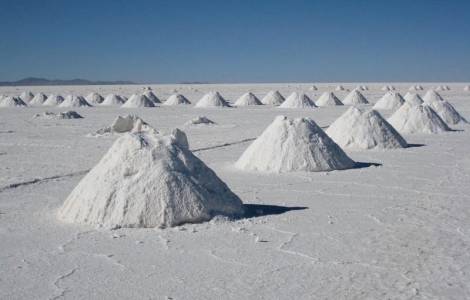
pigrizia.it
Rome (Fides News Agency) - Africa holds 30-75% of the world's reserves of lithium, phosphate, copper, chromium, manganese, gold, platinum, diamonds and aluminum.
Some of these are minerals, such as lithium, which are indispensable to the so-called energy transition, that is, going from a gas and petrol-based economy to one based on renewable sources. Zimbabwe - country where on August 23 presidential elections will take place - has Africa's largest lithium reserves, which are also the fifth largest reserves of said mineral on the planet. In 2018, Zimbabwe and Namibia were among the top ten lithium producers globally. Zimbabwe should be capable of meeting 20% of the overall global demand in the coming years. The Bikita mine, in the province of Masvingo, in the southwest of the country, is the biggest lithium mine in Zimbabwe, holding approximately 11 millions tons of said mineral.
These known reserves are joined by those in the Democratic Republic of the Congo which could be the vastest on earth, turning the DRC into one of the world's primary lithium suppliers. The DRC's main lithium mines include Manono, which holds roughly 6,640,000 tons of lithium - according to the September 2022 estimates - like the Gatumba-Gitarama mine.
Then there's Mali, whose principal mines are Goulamina with 1,570,000 tons of lithium and Bougouni (236,500 tons), as well as Nigeria, with some of Africa's most promising lithium reserves. However, Nigerian production at the moment has stopped at the roughly the 50 tons of the mineral extracted in 2019.
Competing for African lithium are Chinese, American, Australian, Canadian, Indian and European interests. At the moment Beijing is leading the race, partly due to the fact that China already controls 60% of the global extraction and refinery of minerals, particularly lithium, cobalt, nickel and manganese. As far as lithium is concerned, the Chinese presence is reinforced by the fact that three Chinese companies have acquired shares in lithium mines in Zimbabwe, within the purview of Beijing's policy of diversifying the supply of this mineral, especially now that China has the world's largest electric vehicle market. China is present at full strength in the mineral sector in the DRC, especially when it comes to the production of cobalt and lithium. Chinese companies have launched projects not just for the extraction, but also the refinery of lithium in the DRC and in Zimbabwe. Competing with China's presence in African lithium mines are American, Australian, Canadian, Indian and European companies.
This could lead to further criticism from the West regarding the fact that China is prioritizing its interests at the expense of African nations, in order to foster African opposition to Beijing's mineral investments. The emphasis is above all on the potential environmental and social repercussions of the mining process, like displacing local communities and the environmental damage caused by the extraction and processing of minerals, which require clearing the terrain in ways that could damage both the soil and the water.
An 83% increase in the demand for lithium, on part of battery producers, is expected by 2027. This could be an extraordinary opportunity for African countries to fortify the continent's global economic standing and enhance their position on the international stage. (L.M.) (Fides News Agency 19/8/2023)